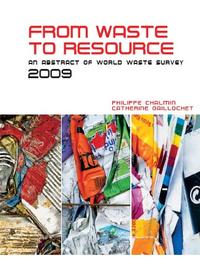World waste market valued at over £272 billion
 The waste and recycling market is worth at least £272 billion a year worldwide and will become more and more important as resources become scarcer, according to a pioneering study published yesterday (March 16) by Veolia Environmental Services.
The waste and recycling market is worth at least £272 billion a year worldwide and will become more and more important as resources become scarcer, according to a pioneering study published yesterday (March 16) by Veolia Environmental Services.The 451-page report, entitled ‘From Waste to Resource - an abstract of world waste survey 2009’, draws on data from the EU, Organisation for Economic Cooperation Development (OECD) and Veolia to provide an in-depth analysis of how waste is managed across the globe.
Produced by CyclOpe, a leading European research institute for commodity markets, the research builds on a similarly-titled study from 2006 and claims that, even though commodity prices dropped sharply at the end of 2008, there is still a long-term trend towards resource scarcity which will make the recovery of waste - through both recycling and energy recovery - more and more attractive.
It was written by Catherine Gaillochet, a legal expert specialising in environmental law, under the direction of Philippe Chalmin, professor with the Paris-Dauphine University and chairman of CyclOpe.
Launching the report in London, Jean-Dominique Mallet, chief executive of Veolia ES UK, said: “In 2005 Philippe came to us and we decided to help in the publication of this document. We believe it’s the only report with regards to its capacity to look at waste management worldwide. It lays out the challenges that we are facing in this industry and in the years to come.”
“Waste has only decreased in the UK economy because the economy has decreased so it is interesting to look at the worldwide and long-term trend.”
Resources
The study estimates that, at present, the world produces at least four billion metric tons of waste a year - equivalent to world production of grain and steel combined. However, Professor Chalmin stressed that that figure excludes construction, mining, agricultural and forestry wastes - suggesting that the real figure is much larger. This prompted him to claim that “we live on a mine of underused waste”.
Of this, only around one billion tonnes is thought to be recycled, composted or used to produce energy.
Professor Chalmin explained that humankind had traditionally fostered a notion of rarity with regards to resources, but that the Industrial Revolution had led to the expectation that resources were infinite when in fact they were not, because they could be easily exploited. He said that this balance was again changing but that it would need to move even further as populations increased and demand for materials grew.
As a result, the study found a strong link between gross domestic product (GDP) and waste arisings. For instance, those in developed countries produce an average 1.4 kilogram (kg) of waste per capita per day, compared to 0.6kg in the Third World.
Similarly, the make-up of waste was found to vary depending on the wealth of a country. More value could generally be extracted from waste from richer countries, where waste tended to be dryer and more suitable for recycling.
Municipal
Looking at municipal waste in particular, rich countries with not much space were found to send the largest proportion of their waste to incineration - with Japan and Denmark topping the list in 2006, followed by Sweden, Switzerland, France, Germany and the USA.
Larger countries or those with a tradition for landfilling due to their clay soil were found to send the largest proportion of their waste to landfill with Turkey in the lead, followed by New Zealand, Australia and the UK.
For recycling, excluding composting, South Korea, Switzerland and Germany were the top performers. Professor Chalmin explained that South Korea achieved this because it was quite isolated and did not import many resources, so had a much more comprehensive recycling policy. Other countries were thought to do well because of their high environmental awareness.
For developing countries meanwhile, landfill was found to be the most common waste treatment method, with many unregulated “wildcat” sites, where informal recycling took place. For instance, there are 40,000 people who work informally on landfills in Cairo, Egypt, alone and 11,000 in Lima, Peru. However, data from these countries was limited.
Veolia
Commenting on what the study meant to Veolia, Mr Mallet said that it confirmed the company’s approach to waste as a resource which it had adopted six years ago.
He added: “Based on this [report] I think the trend will be towards more recycling. There will be a trend of meeting the 50% [revised Waste Framework Directive] target set by the EU. Although there is some limit in size where the last 20% of recycling will cost you 80%.”
“I think the technologies are getting better in many areas. I also believe that education and upstream issues will be extremely important. Education is critical.”
To download a copy of the report please click here.
You can return to the main Market News page, or press the Back button on your browser.

